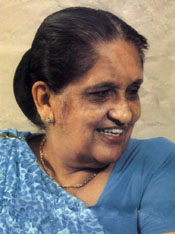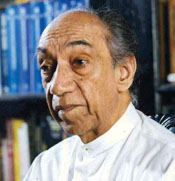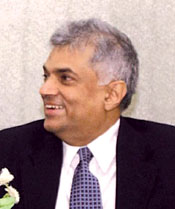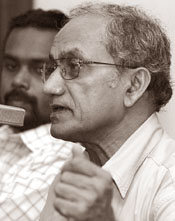Negative capabilities of the JVP
 POLITICS:
Having discussed internal dissension between two major parties last
month, the SLFP and the UNP, it seems appropriate to devote some space
to the JVP, the other important player now in the political game.
Significantly, there seems at present little evidence of internal
dissension there, which is worth considering in itself. POLITICS:
Having discussed internal dissension between two major parties last
month, the SLFP and the UNP, it seems appropriate to devote some space
to the JVP, the other important player now in the political game.
Significantly, there seems at present little evidence of internal
dissension there, which is worth considering in itself.
This should be done perhaps in the context of my assertion, when I
started this column, initially decided to use the title ‘Politics,
Policies and People’, but I realised this made little sense since in Sri
Lanka, policies rarely govern perceptions, actions or reactions. I wrote
then, that ‘the JVP may be an exception to this rule, but I would argue
indeed that it is an exception that proves the rule, as its history has
shown’.
What I meant was that the JVP is unusual in being devoted to
particular policies. But, whereas other parties have changed their
policies both because of changing circumstances and the priorities of
particular people, the JVP has ignored not only individual aspirations
but also actual realities in its adherence to what it presents as
established policies.
More importantly, and I think sadly in the present context, it
equates policies with strategies, and therefore, tends to lose sight of
final goals because of its devotion to particular means.
JVP responsible for Premadasa’s 1988 election victory
|

Sirima Bandaranaike
|
|

J R Jayewardene
|
|

Ranil Wickremesinghe
|
|

Somawansa Amarasinghe
|
To illustrate my point I can do no better than go back to what
happened in 1988, when the JVP, having perhaps been primarily
responsible for President Jayewardene’s decision finally to call it a
day, then ended up ensuring the election of a UNP successor.
I will paraphrase here what appeared in my earlier book ‘Sri Lanka in
Crisis: J R Jayewardene and the erosion of democracy’, which will also
appear in the updated version ‘Declining Sri Lanka’, which should be
available soon.
I wrote then that there seem to have been a number of reasons for the
decision of the JVP to urge Mrs Bandaranaike to boycott the election,
and then in effect to turn its guns on her, which ensured that she lost.
The JVP call for a boycott led to extremely low polls in the South,
with Mrs Bandaranaike being the loser even more pivotally than Ranil
Wickremesinghe lost by the LTTE boycott in 2005.
That of course was swiftly forgotten by the drawing rooms of Colombo,
even though on the earlier occasion government goons also exacerbated
the impact of the boycott in areas where Mrs Bandaranaike was expected
to do well.
I wrote then that a number of factors seem to have contributed to the
JVP decision. One was that, it was disconcerted by Mrs Bandaranaike’s
candidature, since that renewed the possibility of democratic change,
whereas the JVP had capitalised on recent feelings that democracy had
been destroyed and armed revolution was the only possible answer.
Then there were also those who, having seen how effective violence
had been in the preceding few months, wanted to continue with that sort
of campaign.
Though many of these were among the younger cadres, in the pattern
that had earlier characterised developments in Tamil militancy, there
were also those in authority who saw such a strategy as preferable.
Their belief seems to have been that a Premadasa victory and the
consequent marginalisation of the SLFP would prepare the ground for
revolution more satisfactorily.
But my point then was that they should have realised there was some
risk in this approach, since a Premadasa regime following a contested
election would have more authority than Jayewardene had exercised over
the preceding year.
The aspects of what could happen were already visible in that as the
Armed Forces had begun to move more forcefully against the JVP even in
the South, when it became clear that there was no close identity of
interests between the SLFP and the JVP.
But, even then it was possible that there were those in the JVP who
would still have thought such a strategy preferable, on the grounds that
what had in the end to be achieved was total revolution.
At the same time such an approach may have been advocated too by
those in the JVP who were sympathetic towards Premadasa. Interestingly,
I wrote then that such sympathy may have been due not only to Premadasa
being seen as opposed to the elite that had dominated Sri Lankan
politics previously, but also because of the influence of the ELJP, the
party that had been set up by Rukman Senanayake when he finally left the
UNP.
The ELJP had initially brought the JVP into the coalition of parties
that opposed President Jayewardene, but dropped out, and opposed Mrs
Bandaranaike.
As I wrote then, ‘it continued to keep up its contacts with the JVP,
which appeared to provide Premadasa too with a link; unlike Jayewardene
he was extremely careful to refrain from criticising the JVP, but
insisted rather it was the SLFP that was responsible for the anarchy
that gripped the country’.
But the consequence of all this was that, while Rukman Senanayake and
his ELJP were happily absorbed by the UNP, the JVP was decimated and its
leadership all killed, except indeed for Somawansa Amarasinghe.
Recently, it was suggested in a newspaper article that some members of
the leadership had wanted to support Mrs Bandaranaike back in 1988, but
the more doctrinaire elements had prevailed.
Perhaps there are parallels to the situation now, since one would
assume Nandana Goonetilleke cannot be alone in his view that the present
government is more likely to pursue ultimate JVP goals than any other.
But, as recent events and pronouncements have made clear, the JVP has
decided that compromise is out of the question.
Current JVP goals
This decision must be assessed in terms of what one assumes to be the
final policy goals of the JVP. One is preservation of a united Sri
Lanka. Sadly, this very reasonable goal, shared it seems by all players
in the game, national and international, except for the Tigers, has been
obfuscated between various terms, unitary and federal, devolution and
decentralisation.
There are those who think federalism and devolution will lead to
increasing autonomy for the separate units, and therefore, to
disintegration of the country.
Though historical experience argues against such a view, the counter
example of the Soviet Union is often adduced as a warning. Sadly, world
history is unknown amongst the younger generation of Sri Lankans.
Even more sadly, as is also apparent from the students who have come
to university in the last decade or so, the few who are supposed to have
studied politics, or who are interested in the subject, believe that the
Soviet Union broke up because of American manipulation. That there were
internal problems that precipitated the crisis is wholly ignored.
The JVP therefore seems to think a unitary state is sacrosanct. This
is ironic in that, way back in 1981, when President Jayewardene
introduced District Development Councils, it contested those when the
SLFP boycotted them.
Of course those DDCs did not really devolve power, so there is no
fundamental inconsistency, but my point is that when the rest of what
might be termed the nationalist opposition opposed any devolution, the
JVP was more enlightened.
Now that the whole world has moved towards understanding the need for
greater pluralism, it is sad that the JVP seems to have regressed.
But, this I think has to be examined in the context of its other
fundamental goal, which still seems to be that of the all-encompassing
state. Here again one is struck by their seeming to be in a time-warp,
when the rest of the world has moved far beyond that.
But here they are conscious that the people at large do not really
believe in that sort of statist socialism, and therefore that aspect is
downplayed, while they strive to oppose the government publicly in terms
of the constitutional issues.
In reflecting on these matters, I was reminded of the MoU signed
between the UPFA and the JVP when it agreed to support Mahinda
Rajapaksa’s campaign, and indeed did so with remarkable commitment.
At the time I had no problem with the clauses relating to the ethnic
issue, because those were basically about reducing the authoritarian
gains of the Tigers consequent to the Ceasefire, and introducing
democratic and human rights principles to the affected areas. What did
worry me was the commitment to do away with ‘the so-called liberal open
economy’.
No turning back
In that respect however, Mahinda assured that there was no turning
back and that the country would continue to move into the modern world,
though there would be greater emphasis on social welfare and equity.
Having worried previously about the more libertarian approach of the
Ranil’s government, this was of course quite acceptable, and indeed soon
after it was reported that the JVP too had declared that what they meant
was a mixed economy.
Obviously, in a mixed economy, the relative balance cannot be
prescribed, and it was understandable that different elements in the
government would have different ideas.
In this respect indeed there are those in the SLFP who are as statist
as their JVP counterparts, though this may be more for convenience than
ideological reasons.
But whereas on balance President Rajapaksa has tried rapidly to
modernise, and indeed approached Premadasa like efficiency, as opposed
to the two leaders who preceded him, with regard to Norocholai and Upper
Kotmale, the JVP has sensed that development on such lines will not be
conducive to a restoration of the absolutist state.
It makes sense then for them, if not to stop President Rajapaksa, to
slow him down. They have two weapons with which to do this, or rather
two issues, since there are many weapons with which to exploit these.
The first issue is public sector restructuring, the second is
constitutional reform.
The first however is not of great concern to the country at large,
and even the majority of public servants would not object despite the
clamours of a vocal minority. Transparency, as with the SLTB and SLT, is
the key, and ensuring that public servants realise the benefits to them.
Of course tying up that issue with the cost of living may yield
better results to those who want the dinosaurs to continue, but the
government is aware of that and the need to limit agitation on that
score. So, there remains the issue of constitutional reform. This is
potentially an emotional issue, and in particular if others get in on
the act.
Though the JHU, while reaffirming what it would not want, seems
disinclined to rock the boat, it is possible that the UNP may refuse, as
in 2000, to support any substantial measures of devolution.
Sadly, the current allegations about the President’s relations with
the Tigers may be used as an excuse to oppose a settlement that the
Tigers also oppose, with the claim that it is based on some secret
understanding.
After all in 2000 Ranil allowed his storm troops to burn President
Kumaratunga’s proposals on the floor of the house, on the grounds that
they conceded too much to the Tamils, even while the TULF was rejecting
them as inadequate.
Chaos at this time with regard to the constitutional issue would be
disastrous, because it would also slow down the reforms in other areas
that are so urgent. The government’s ten year plan shows clear
understanding that the two issues are in a sense related.
In the health sector, for instance, which fortunately has a Minister,
like his counterpart at energy, who can conceptualise, management
changes are predicated on greater decentralisation, while in housing for
instance there is clear recognition that the nanny state must retreat
and allow individuals greater responsibility for themselves, albeit with
structured support.
But, while there is much further to go, none of this will appeal to
the JVP in its present atavistic mood. I hope later to show that such a
mindset is tragic for the country, and is indeed likely to prove tragic
for the JVP and for the rural youngsters it should be promoting towards
productive lines of their own, not simply as tools to a regressive goal.
For the moment I hope that the rest of the country, the silent
majority who have moved with the times, will look at issues on their
own, and not allow the confrontational extremes that dominated the
eighties to wreak destruction again.
|

